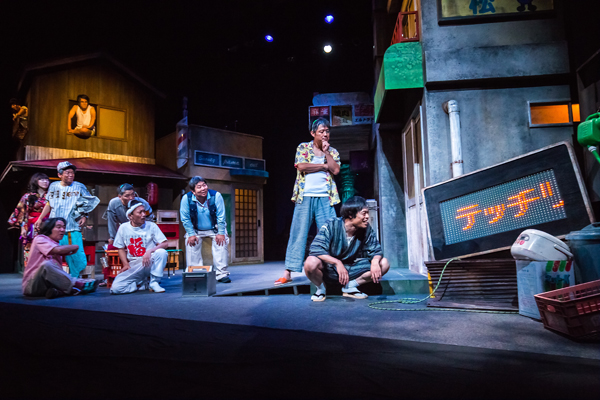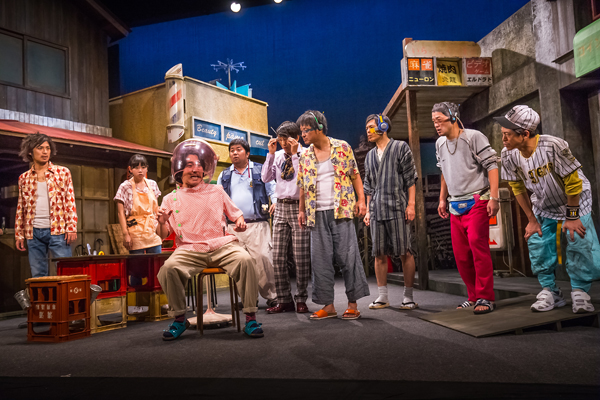

Europe-Kikaku 35th stage
This New World that Had to Come
Photos: Toshihiro Shimizu
Data
:
Premiere: 2016
This New World that Had to Come

Born in Kyoto in 1979. When he entered Doshisha University in 1998 Ueda joined the University’s small-theater company. That same year he formed the unit Europe-Kikaku within the company. In 2000, Europe-Kikaku officially became an independent theater company. As its representative, Ueda has since served as the playwright and director for all of its regular productions. His plays Fuyu no Yurigera , Kakomu Formation , Heibon na Way and Windows 5,000 have all been selected as a finalists for the OMS Drama Award. In 2009, a movie was made based on his play Fuyu no Yurigera and released under the title Magare, Spoon . In 2010, the television anime Yojo-han Shinwa Taikei (The Tatami Galaxy) that he contributed the composition and script for won the Grand Prize in the anime category of the 14th Agency for Cultural Affairs Media Arts Festival. Ueda was also the winner of the Ohkiri (comical show) event “Dynamite Kansai 2010 third”. He also appears in numerous events like Kikaku Night. Ueda is also active as a writer for plays outside his own company, as well as for movies and dramas and programs for television and radio. In 2017, his play This New World that Had to Come won the 61st Kishida Drama Award.
Europe-Kikaku
https://www.europe-kikaku.com/


Europe-Kikaku 35th stage
This New World that Had to Come
Photos: Toshihiro Shimizu
Data
:
Premiere: 2016
The setting is a place on the edge of Osaka’s Shinsekai shopping and business district where a group of late-middle-aged men (among them the
shogi
[chess] player Ishida, the laundromat owner Wakamatsu and the barber Honda) who are regular customers of the Japanese style grill “Kite-ya” sit around clapping loudly for the female singer, who sings standing atop a beer case, and making merry as usual.
The attractive “face” of the shop is Manatsu, who lost her mother a few years ago, a loss that also caused her father to turn to drink and left her to care for the shop by herself. Now there are tourists using drones to film what goes on in the shop without her permission.
Since the implementation of the drone highway system, Osaka’s skies are full of a variety on drones, like restaurant take-out delivery drones and parcel delivery drones. A techno geek who likes Manatsu often sends a tablet-equipped drone from his place in the Shiodome district of Tokyo to order her Kite-ya skewered pork cutlet dish.
After someone uploaded a secretly shot video of her Kite-ya cook giving some skewers a second refresh of sauce on a gourmet blog, the reputation of the shop plummeted. The techno geek who orders the skewered cutlet dish frequently, who is also the CEO of a new-technology planning venture, has gotten that video removed from the Net on the basis that it was illegally taken. After being asked to come to Tokyo for a date with the techno, Manatsu is teaching a robotic arm that the techno sent her how to grill the skewered cutlets so that she can leave the shop for a while for the date in Tokyo.
Kawamatsu is having a fight with a stray security robot that has snuck into the shop. It appears that robots that were previously abandoned by their owners have learned how to survive in the wild on the streets, moving around of their own will.
Kawamatsu’s son Kinji, who had left home with the dream of becoming a comedian, now returns how after having been beaten out by a robot in a TV comedy showdown. Kinji’s return revives feelings of affection in Manatsu and she decides to turn down the date with the techno. Meanwhile, impressed by the devotion of the stray security robot, Kawamatsu decides to take it in as a member of his family and gives it the name Patro.
A goggle shaped gadget outfitted with an artificial intelligence function has been invented, and using an app called Charin, it can supposedly estimate the future earning capacity of the person in front of you. While the middle-aged regular customers of Kite-ya are playing with the goggle gadget, the techno from Tokyo comes into the shop in person to ask Manatsu to accept his offer for a date again. His appearance by chance leads to a game of
shogi
chess between the chess-player Ishida and the techno using a rice-cooker equipped with artificial intelligence. It turns out to be a hands-down win for the techno. That night, the rice-cooker acquires a personality.
When Kinji is holding the rice-cooker, there is suddenly a jump in his future earning power on the Chain app when seen through the goggle gadget. It convinces everyone that if Kinji and the rice-cooker with its artificial intelligence form an odd-couple comedy team they will be a big success. With this, Manatsu and Kinji are finally married with everyone’s blessing.
Honda, another of the middle-aged regulars at Kite-ya, is in love with the virtual reality prostitute avatar Rinne-chan from the red light district. While on a date with Manatsu’s virtual reality avatar, the techno modifies a dryer to create a machine that enables Honda and Rinne-chan to cross the boundary between reality and virtual reality and begin living together.
But, once she is able to access reality, Rinne-chan runs away. Using an emergency device, the techno erases Rinne-chan’s data, but at the last moment it jumps into a Billiken and the two are able to live begin living together again.
Using the wristband that was found to have recorded in it the life log of Manatsu’s late mother, her father is now searching desperately through the log.
In the community at large, the family restaurant chain named Cyberzeri-ya run by a cyber president has become a big success. The female singer who sings at Kite-ya says that she also wants to do a backup of her brain, and the middle-aged patrons of the shop use a PC display to create a “Singer-doll Dash” character. But, it turns out that such double existences are illegal.
This causes an artificial intelligence explosion that makes the business principles of the Cyberzeri-ya restaurant chain to go berserk. The result is a rapid increase of the number of restaurants in the chain, and the green light emitted by the Cyberzeri-ya pirates control of the city of Osaka. At that moment, the artificial intelligence security robot Patro, the rice-cooker and Rinne-chan communicate through the Tsutenkaku broadcasting tower to stop the take-over crisis. The aggregate database of Manatsu’s mother’s life log kept in the Tsutenkaku Tower was used to control the will of the completely artificial intelligence body that is the Cyberzeri-ya chain president.
With this, the Shinsekai community is saved. The President assigns Manatsu’s mother to post of area manager for the Perseus constellation and her remains are dispersed in the form of interstellar spatial thought.
Again today, the middle-aged regular customers of Kite-ya are making merry as usual. And, we can see their artificial intelligence counterparts nearby.
Related Tags